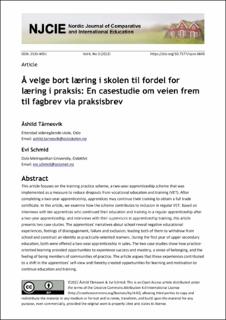| dc.contributor.author | Tårnesvik, Åshild | |
| dc.contributor.author | Schmid, Evi | |
| dc.date.accessioned | 2023-01-05T12:21:24Z | |
| dc.date.available | 2023-01-05T12:21:24Z | |
| dc.date.created | 2022-09-19T18:24:25Z | |
| dc.date.issued | 2022-09-20 | |
| dc.identifier.citation | Nordic Journal of Comparative and International Education (NJCIE). 2022, 6 (3), 1-16. | en_US |
| dc.identifier.issn | 2535-4051 | |
| dc.identifier.uri | https://hdl.handle.net/11250/3041229 | |
| dc.description.abstract | This article focuses on the training practice scheme, a two-year apprenticeship scheme that was implemented as a measure to reduce dropout from vocational education and training (VET). After completing a two-year apprenticeship, apprentices may continue their training to obtain a full trade certificate. In this article, we examine how the scheme contributes to inclusion in regular VET. Based on interviews with ten apprentices who continued their education and training in a regular apprenticeship after a two-year apprenticeship, and interviews with their supervisors in apprenticeship training, this article presents two case studies. The apprentices’ narratives about school reveal negative educational experiences, feelings of disengagement, failure and exclusion, leading both of them to withdraw from school and constructing an identity as practically-oriented learners. During the first year of upper secondary education, both were offered a two-year apprenticeship in sales. The two case studies show how practice-oriented learning provided opportunities to experience success and mastery, a sense of belonging, and the feeling of being members of communities of practice. The article argues that these experiences contributed to a shift in the apprentices’ self-view and thereby created opportunities for learning and motivation to continue education and training. | en_US |
| dc.language.iso | nob | en_US |
| dc.publisher | OsloMet - Storbyuniversitetet | en_US |
| dc.relation.ispartofseries | Nordic Journal of Comparative and International Education (NJCIE);Vol. 6 No. 3-4 (2022): Special Issue: Inclusion in vocational education and training (VET) | |
| dc.rights | Navngivelse 4.0 Internasjonal | * |
| dc.rights.uri | http://creativecommons.org/licenses/by/4.0/deed.no | * |
| dc.subject | Vocational education | en_US |
| dc.subject | Vocational training | en_US |
| dc.subject | Dropouts | en_US |
| dc.subject | Apprenticeship training | en_US |
| dc.subject | Learner identities | en_US |
| dc.title | Å velge bort læring i skolen til fordel for læring i praksis: En casestudie om veien frem til fagbrev via praksisbrev | en_US |
| dc.type | Peer reviewed | en_US |
| dc.type | Journal article | en_US |
| dc.description.version | publishedVersion | en_US |
| dc.rights.holder | © 2022 Åshild Tårnesvik & Evi Schmid | en_US |
| cristin.ispublished | true | |
| cristin.fulltext | original | |
| cristin.qualitycode | 1 | |
| dc.identifier.doi | https://doi.org/10.7577/njcie.4849 | |
| dc.identifier.cristin | 2053278 | |
| dc.source.journal | Nordic Journal of Comparative and International Education (NJCIE) | en_US |
| dc.source.volume | 6 | en_US |
| dc.source.issue | 3-4 | en_US |
| dc.source.pagenumber | 1-16 | en_US |

